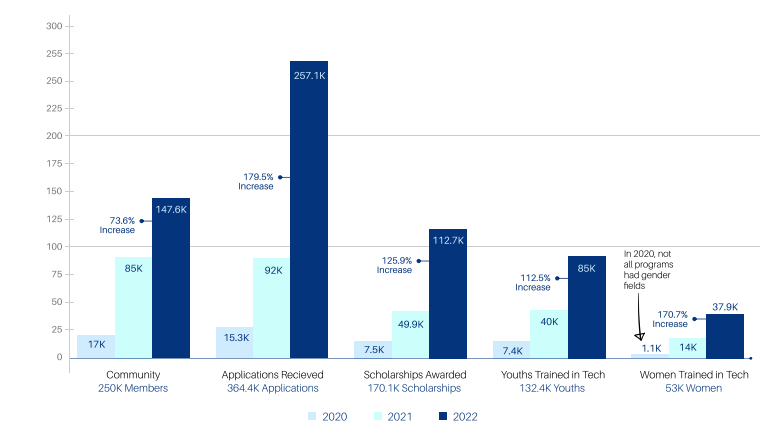On a macro scale, we all remember 2022 for different events, depending on which impacted us the most. Geopolitics enthusiasts won’t forget the Russia-Ukraine war, and football lovers won’t forget the world cup. It’s the same way in tech: everyone remembers 2022 as tech winter when capital markets became more cautious with funding, and we saw an unprecedented number of startups close shop. And as though that wasn’t enough, we witnessed the Great Layoffs. Tech giants like Microsoft, Amazon, Meta, and Twitter, among others, laid off legions of techies. The layoff wave didn’t spare Africa’s young ship: well over 1000 techies in startups lost their jobs in 2022.
You’ll expect that these stats would deter young Africans from pursuing tech careers. But that’s not the case. What we’re seeing is the opposite — a year-on-year growth in interest. According to their 2022 Impact Report, When Ingressive for Good, a leading African ed-tech non-profit, called for applications for its tech training programmes, it received 257.1k applications. That was nearly three times as many people that applied in 2021. And it didn’t stop there. Scholarships awarded and youths trained also more than doubled compared to 2021.

The effects of this spiking interest also show in Ingressive for Good’s general community. The number of new members from last year was more than the previous two years combined. Its follower count also grew by 170% across social media platforms, while its student community increased by 269% to 91,600 students.
Before 2022, most people only associated the tech industry with seemingly facile high-paying jobs. But that’s not the case. Last year was a harsh reminder that the tech industry can be volatile, and building a career in it needs resilience and determination. What we saw in 2022 was a large-scale defiance of a bear market by African youths to become part of the continent’s fast-growing tech ecosystem. The other argument would be that techies went through the entire Gartner hype cycle in one year.

The reasons for this high interest among youths, and Ingressive’s consequent impressive growth, are not unfamiliar. Firstly, unemployment is rife in Africa. And according to the World Bank, young people make up 60% of the continent’s jobless population. Meanwhile, tech has a reputation for (almost) leaving no one behind. For instance, the unemployment rate for tech occupations in the U.S. stood at 2.3 per cent in 2022, despite the mass layoffs. With or without mass layoffs, the tech industry still struggles with a talent shortage. In 2020, CNBC reported nearly 1 million unfilled tech roles with only 165,000 potential applicants. In the same year, 79 per cent of CEOs globally had concerns about tech talent shortages, and 61 per cent of HR professionals believed that tech talent shortages would be their biggest challenge in 2022.
The most effective plug for this gap has been remote work, which allows companies to hire from anywhere. And so, African youths are positioning themselves to be available for global opportunities by equipping themselves with highly in-demand tech skills.
The second reason is similar: African youths desire high-paying jobs, which aren’t in enough supply outside tech. In 2020, the World Bank reported that Sub-Saharan Africa had the highest poverty rates, with almost 70 per cent of the region’s population living below the US$3.20 poverty line and nearly 90 per cent under the US$5.50 poverty line. Meanwhile, according to a report by Payscale, a tech employee earns 2x more salary than a peer in a non-tech role, and the gap widens with time.

This is why the work done by organisations like Ingressive for Good is so vital. Other organizations, such as ALX and AltSchool Africa, also focus on building tech talents for the market. Africa’s youths can be the answer to the global tech talent shortage, but they need to be trained to compete at that scale. And how well these youths compete will play no small role in Africa’s prosperity story.




